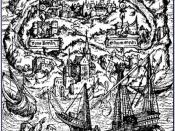Sir Thomas More's conclusion of the document is that if one cared for another, the distribution of goods would be equal. If no man owned land, each person would be in abundance of prosperity and exuberance. His document reflected on the Utopian paradise.
Sir Thomas More was a prominent member of parliament and lawyer. He understood ways of living under the England and European Monarchies. Utopia was written in the year 1515 and was written for that time era, but would not be considered Utopia in modern day 21 st century. The Idea of a Utopia today would be different from that of the year 1515 because of the vast technology gap that exist now. More's beliefs were heavily differentiated from the time era he lived as his ideas were influenced by views of womens inequality and views on styles of living. England and other European Monarchies were cynical and inattentive as a whole in the eyes of More. The land and wealth was kept by the wealthy as leisure and not treated as a necessity. This empowered the wealthy and gave them the aptitude to keep control over all that they desired.
More was that of a middle class man but was able to see the conditions of the lower and poorer class people. These classes seem to be the influences of his documents. By directing the idea of a Utopia to the lower class gave them a feeling of hope to find a better way of living. The upper class seen the lower class as an inferior part of their humanity and would not succumb to the utopia lifestyle and would not live as equals with those they see as inferior to them.
Many words could be lost in the translation process and can be taken...


